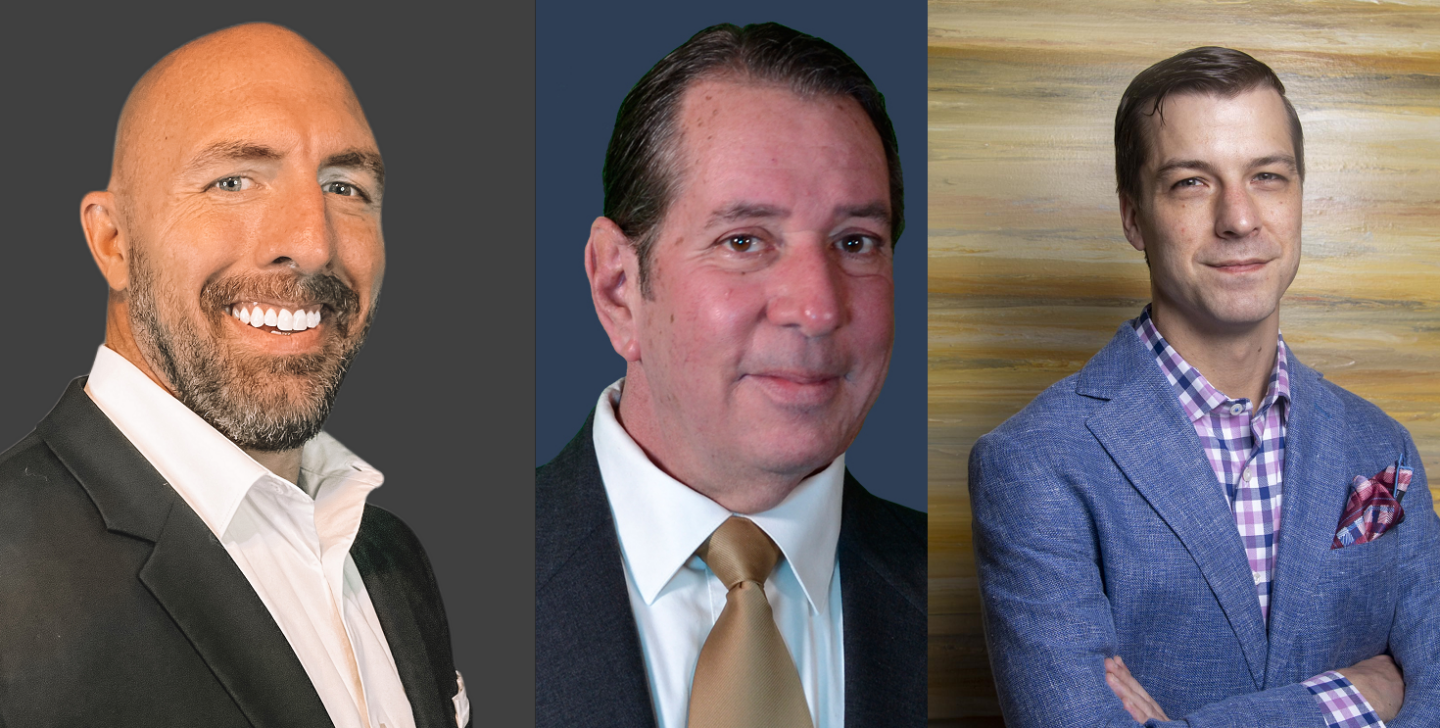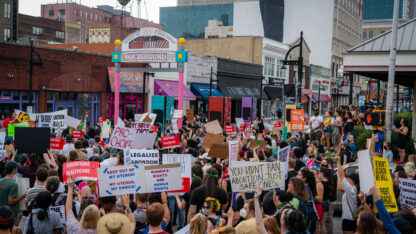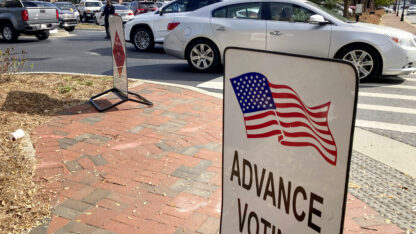What is to become of the 81,278 voters who marked their ballots for Libertarian Chase Oliver in Georgia’s U.S. Senate race? Will those voters return to the polls for the Dec. 6 runoff between Sen. Raphael Warnock and Herschel Walker?
Those 81,278 Georgians could sway the pivotal Senate race, but there are doubts among experts whether those voters who chose a Libertarian in Round 1 will even show up for the Dec. 6 runoff for Round 2.
“Libertarian voters usually lean more conservative, and thus toward Republican candidates when they must pick between only the two major parties’ candidates,” said Dr. Amy Steigerwalt, associate chair of the Political Science department at Georgia State University.
“The issue, however, is that Libertarian votes are a sort of protest vote, signaling that neither of the major party candidates is one the voter supports. It is thus much more likely that those voters will simply stay home during the runoff.”
On Libertarian voters, Charles Bullock, professor of Political Science at the University of Georgia, said, “They’ll have an impact if they vote, but they are less likely to vote than individuals who turned out and voted for Walker or Warnock.”
Bullock estimates that as many as two-thirds of those 81,278 votes the Libertarian Oliver received may be Republicans who could not bring themselves to vote for Walker.
“I say two-thirds because three times as many people voted Libertarian in the Senate contest as voted Libertarian for governor,” he said. “So these individuals think of themselves as Republicans, but they had serious concerns about Herschel Walker.”
So, Brian Kemp was an easy choice for governor for Libertarians and they lined up behind him. Libertarians, who lean conservative, did not like Walker for the most part and voted for Oliver.
And now that the Democrats were able to keep control of the Senate, Bullock feels people who “parked their vote” with the Libertarian Oliver have even less incentive to come out to the polls.
One of the voters who chose Libertarian candidate Oliver over Warnock and Walker in the Nov. 8 race is going to come out to vote in the runoff. He’s just not sure which candidate is going to get his vote.
“I’m still looking at both candidates because I haven’t made a decision yet,” said Philip, a reliably Republican voter from Forsyth County who participated in a survey of voters conducted this fall by the University of Georgia. He declined to give his last name. Philip says he voted for the Libertarian Oliver because of concerns about Walker’s fitness for the job.
“It’s easier to judge a candidate if they have some type of political path,” Philip said. “I have that with Warnock and while there are things he’s voted for that I haven’t been a fan of, there are other things he’s done well. I don’t have that with Walker. I am going to vote, though.”
Many other voters who cast a ballot for the Libertarian Oliver cannot bear to vote for either Walker or Warnock and that should concern Walker’s camp, Steigerwalt said.
“The fear, especially for Walker’s campaign, is that all of the people who declined to vote in his race the first time, and all of those who cast Libertarian votes, will simply not show up for the runoff,” Steigerwalt said. “Add to that the traditional decrease we see from general election turnout to runoff turnout, as well as evidence that there quite a few Kemp-Warnock voters in the general election, and the signs suggest Walker has to do a lot of work simply to shore up support from Republican voters who are concerned about his candidacy.”
Middle is widening
Ted Metz, who was the Libertarian candidate for Georgia Secretary of State, said in an email that Georgians who voted for Oliver likely still have strong policy differences with both of the men now in the Dec. 6 runoff.
“My belief is that people (real people, not phantom voters) who turn out to vote only do so if they feel that their vote will affect the change they desire, or make a statement,” Metz wrote.
He is sure, however, that the middle is widening, which is ground Walker and Warnock want to control in the runoff.
“What I do know is that the population of voters in the US is no longer as broadly polarized as it has been in the past,” Metz wrote.
Is there anything that could sway a Libertarian to vote for Walker or Warnock, perhaps a change in their messaging in the last two weeks?
It’s not likely because Metz ran off a list of Libertarian policies for the two camps to accede to, including “ending the Fed, ending the IRS, ending the DEA, ending the FDA, ending the Dept. of Education, the EPA, the FBI, the DOJ, and every other agency that is not enumerated in the Constitution under Art. 1, Sect. 8.”
Oliver did not respond to requests for comment, but he told Reason, a Libertarian magazine, he wants to stay involved in the runoff as a facilitator.
“I will be reaching out to both campaigns to host a forum, where they can come speak long-form to Libertarian, independent voters and seek to earn their vote if they so choose,” Oliver said.
“I think it’s still a very wide-open race for this runoff campaign, and I think that should really implore both the major-party candidates to start reaching out and speaking to Libertarian voters and their values, because that’s how they’re going to win this race.”
Oliver is not apologizing for taking the Senate race to a runoff.
“I wanted to be an honest broker,” Oliver told The Guardian newspaper. “I’m hoping that whoever wins this runoff reaches across the aisle a bit more and actually does some real legislating.”
One question that would be interesting to find an answer to is where did the 115,000 voters that cast ballots for Libertarian Shane Hazel in the 2020 Senate race between Democratic nominee Jon Ossoff and incumbent GOP Sen. David Perdue end up in the Jan. 6 runoff two years ago?
Did a significant number choose Ossoff and push him across the finish line? Or did Ossoff win because President Donald Trump poisoned the water for Perdue with claims the election was rigged.
“It would be awfully hard to find that out,” Bullock said.
One thing is certain. Hazel, who ran for governor this election cycle, is not going to push Libertarians toward Walker or Warnock.
“Nobody likes these guys anymore,” Hazel said after an Atlanta Press Club debate when he played disruptor on stage with Kemp and Democratic challenger Stacey Abrams. “They have bankrupted America.
“Why do I have to go out there and lend my name to somebody who is going to use force and coercion.”
This story was provided by WABE content partner Georgia Recorder.









